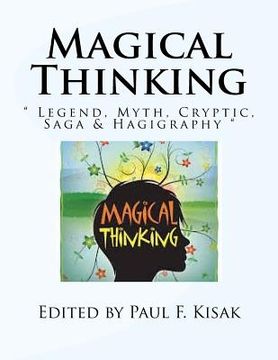Reseña del libro "Magical Thinking: " Legend, Myth, Cryptic, Saga & Hagigraphy " (en Inglés)"
Magical thinking is the attribution of causal or synchronistic relationships between actions and events which seemingly cannot be justified by reason and observation. In religion, folk religion, mythology and superstitious beliefs, the posited correlation is often between religious ritual, prayer, sacrifice, or the observance of a taboo, and an expected benefit or recompense. In clinical psychology, magical thinking can cause a patient to experience fear of performing certain acts or having certain thoughts because of an assumed correlation between doing so and threatening calamities. Magical thinking may lead people to believe that their thoughts by themselves can bring about effects in the world or that thinking something corresponds with doing it. It is a type of causal reasoning or causal fallacy that looks for meaningful relationships of grouped phenomena (coincidence) between acts and events. In other cases, a therapist may employ magical thinking, as used in analytical psychology, to draw meaning from the content of a patient's dreams."Quasi-magical thinking" describes "cases in which people act as if they erroneously believe that their action influences the outcome, even though they do not really hold that belief."Prominent Victorian theorists identified "associative thinking" (a common feature of practitioners of magic) as a characteristic form of irrationality. As with all forms of magical thinking, association-based and similarities-based notions of causality are not always said to be the practice of magic by a magician. For example, the doctrine of signatures held that similarities between plant parts and body parts indicated their efficacy in treating diseases of those body parts, and was a part of Western medicine during the Middle Ages. This association-based thinking is a vivid example of the general human application of the representativeness heuristic. Edward Burnett Tylor coined the term "associative thinking," characterizing it as pre-logical, in which the "magician's folly" is in mistaking an imagined connection with a real one. The magician believes that thematically linked items can influence one another by virtue of their similarity. For example, in E. E. Evans-Pritchard's account, amongst the Azande tribe members it is believed that rubbing crocodile teeth on banana plants can invoke a fruitful crop. Because crocodile teeth are curved (like bananas) and grow back if they fall out, the Azande observe this similarity and want to impart this capacity of regeneration to their bananas. To them, the rubbing constitutes a means of transference.Magical thinking, in short, is the substitution of belief, coincidence and miscorrelation in place of science and fact. This book discusses the background of this concept and is designed to be a reference and provide an overview of the topic and give the reader a structured knowledge to familiarize yourself with the topic at the most affordable price possible.The accuracy and knowledge is of an international viewpoint as the edited articles represent the inputs of many knowledgeable individuals and some of the most current knowledge on the topic, based on the date of publication.

